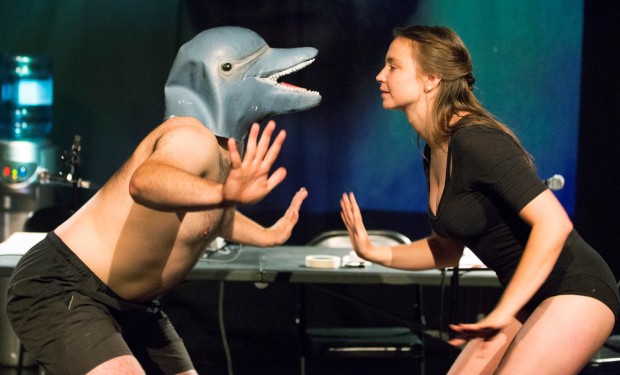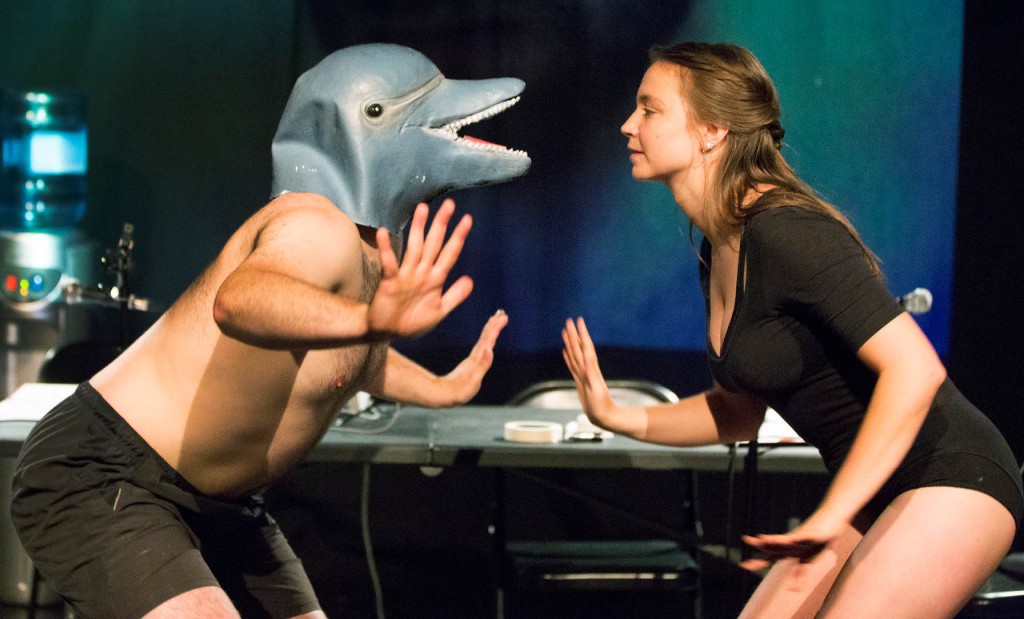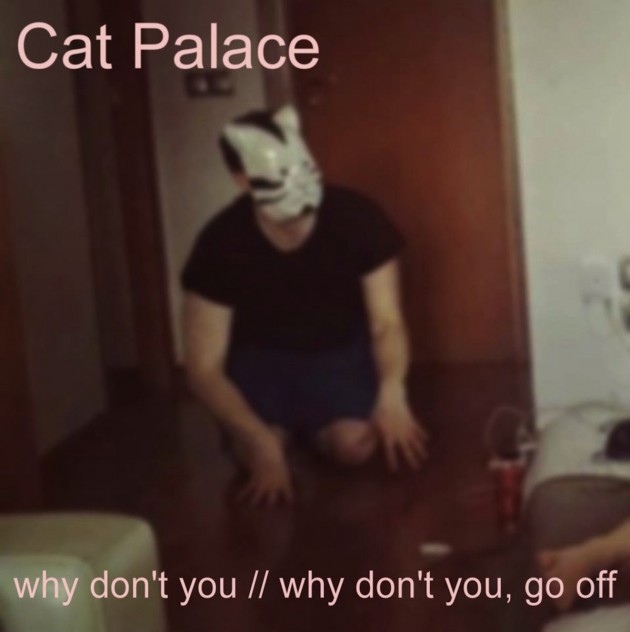In 1965, an American scientist lived with a dolphin for ten weeks to try and teach him to speak English as part of a NASA-funded research project into human-animal communication. Condemned as an elaborate circus trick, these lessons remain a controversial episode in the space race between the two Cold War superpowers.
The critically-acclaimed, Fringe First award-winning TANK rips this history apart to explore the difficulties of bridging cultural divides, the politics behind the stories we tell and what happens when you inject a dolphin with LSD. Ahead of its two-night residency at Belfast’s the MAC across April 20-21, Brian Coney talks to TANK co-director and actor Ellice Stevens.
Go here to buy tickets to the show
As TANK confronts multiculturalism and America’s role on the world stage, it’s safe to say it’s a very timely production. Did a specific event or a series of incidents provoke the initial conception of the production?
Sort of – in January 2015, Billy (co-director) told me to watch a documentary he’d seen called The Girl Who Talked to Dolphins because throughout our friendship we’ve loved chatting about and sharing bizarre documentaries. The Girl Who Talked to Dolphins was all about the human-animal communication experiments led by John C. Lilly in America in the 60s, and how the experiments on St. Thomas resulted with Margaret (a female researcher) and Peter (a bottlenose dolphin) living together in the flooded first-floor of a laboratory. We became obsessed with the story and would have chats about what it would look like as a performance – we felt the dolphins should be a three-piece 60s band which I’m sad to say didn’t make it into the finished show – and it was through those chats we realised that there was a play there. The story feels very inherently theatrical in its structure, and the further we explored it the more we felt the human-dolphin war on words might act as a metaphor (or an actual example) of the United States’ desire for dominion over culture and language during the Cold War, as well as, more urgently, the ways in which fears of the foreign and the unknown are being provoked and exploited today on both sides of the Atlantic. So, we became convinced this was a story important for now and that’s what drove the production forward.
It is set against the backdrop of the the 1960s; the Cold War, transatlantic tension and real sense of absurdism that accompanied the time. Did you consciously employ a multi-layered/multi-media approach, whilst incorporating surrealism and challenging elements, to attempt to capture the sense of confusion of the tussle at hand?
Definitely with the multi-layering – that ‘confusion’ was really important to us and we wanted to make a show that reflected that, but we also wanted to incorporate our own confusion as theatre-makers into the production. Throughout the process of making this show, we debated and struggled over what we believed to be the real story here and so we allowed those narrative struggles to make their way into the shows structure. Then, because the devising process, was long and exploratory and full of those arguments, I think each layer, for us, feels like a series of resolutions to that making process and so it became a textured, multi-layered production which is part film-pitch, part table-read, part rehearsal-room, part debate.
In terms of multimedia, we didn’t know how projections would be used in Tank but we knew they would somehow –as a company we’re made up of three core members (Billy and I who are theatre-makers, and Dorothy who is a film-maker and video artist) and one element of what we’re doing with our shows right now is exploring how recorded media can operate alongside live performances, so we knew this show would be a further examination of that.
Bearing in mind the, shall we say, complicated U.S.-Russian relationship at present, is there conclusions to be drawn or parallels to be made between the production and the murky political Zeitgeist of 2017?
For us, definitely, and I think we invite people to consider that, rather than tell them what conclusions to make. As I said before, the story rings true to the world around us where migrants are dehumanized and the media promotes fear against entire religions and that’s what drove us to make the show and tell the story. The form of the show is about Margaret and Peter back in 1965, but I don’t think you can tell that story as young theatre-makers in 2017 and not find the connections between ‘then’ and ‘now’ potent.
You use multimedia to “rip the special relationship apart”. Without giving too much (or very little away), how did you approach and execute that disassembling?
So, the liberating and difficult thing about making this show was that there isn’t that much out there about it. The BBC documentary we mentioned before was incredible because it was the first time those who had been involved in the experiments, including Margaret, spoke out about their experiences – but in using a documentary as one of our only sources we realised that it had its own narrative. It was very focused on questioning whether or not Margaret and Peter’s story was one of love, and we didn’t all agree with that. So then we began questioning how this story had been represented previously, and how we could represent it differently.
Then, when we had the transcripts from Margaret and Peter’s lessons, it became an exercise in researching as much as we could from Lilly’s books and Margaret’s diaries, and attempting to fill in the gaps using our imagination. So I think essentially that’s what our process was here – we questioned and discovered all we could, so we could piece what facts we had together, and then we share the story, comprised of truth and imaginings, to the audience.
It’s something we’ve chatted about a lot in relation to our first show The Beanfield as well as Tank, I think once you acknowledge that people are watching shows about real events in this Wikipedia age where the full truth can be found after a simple google-search, you don’t have to say everything about the story within the play. We never thought of this show as documentary theatre, so we say what we think is important for our production, and people can fill in their own gaps later if they’re intrigued.
Without having seen the production, I suspect there’s a few elements of universality at play, i.e. the U.S. operating as the bully in a world full of other bullies. Do you think the production can be read beyond the context of America vs. the World as the world against itself?
Definitely – at the very beginning of the play we stand up and say “this is an American story”, and the audience hear that from the mouths of young, British makers and performers, which is indication it isn’t. I think we’re inviting wider readings in every way – someone came out the show the other day and said their whole group all thought it was about something completely different, but this idea of oppressed/oppressor ran through all their interpretations. I think there are so many things to read into it because there’s so many examples of that same dynamic in the world around us that everyone can, and will, read different power structures into it.
You’ve been commended for the use of at times “psychedelic” imagery and allegory on TANK. In the early stages of writing and pre-production, did you collectively consider symbolism and surrealism to be as potent as explicit, so-called straightforward narratives?
The surrealism within the show emerged through the devising process, rather than us chasing it and knowing we would have it from the beginning. That said though, we always said we wanted it to get a bit ‘weird’ because the story is bizarre, and we wanted to pull out the ‘psychedelic’ moments – but the way we’ve done that was never really planned. I think the show is weird, because the story is weird, and as 20-something year olds we all look back and think ‘oh the 60s, that was a weird time, right?’ But the surrealism in the production mainly comes through the way we played with imagery evoked by American cinema more than anything, and how we incorporate that into a show with a very clear narrative where it doesn’t seem like it should really belong.
Breach has, of course, been politically engaged from the get-go. Bearing in mind the early days of the company, do you think theatre has as loud a voice in tackling present-day political issues head-on, in the same way cinema and music does?
In terms of loudness of voice it’s completely different to music and cinema because of how it operates as a medium and how it demands to exist. For one, cinema and music has entirely different distribution and once it’s made and recorded can be experienced again and again with ease. Theatre is a temporal experience – you need to have people in the room, and for however long the show runs the audience will experience the production, and then it’ll be gone. Obviously you can film it, but it isn’t the same – it needs a live audience to be present and engaging in that conversation with the performance. And then funding struggles are making it more and more difficult to even tour productions so you can get a show in the room so the audience can enter in the first place.
So in my opinion, it can’t be compared but that just means it is a different form to tackle political issues in a different way. So, despite it not having as wide an outreach, that isn’t a reason for it not to attempt to tackle those issues. Just because you can sometimes only have 3 people in the room coming to see you doesn’t mean we don’t want to attempt to have those same focuses and aims – theatre is our form for how we can tackle, and so we still will.
The synthesis of bold political interpretation and the realm of comedy can often be fraught with peril, not least in how it’s received by critics and one’s audience alike. Here in Northern Ireland, for example, we’ve increasingly embraced satire (with varying degrees of actual comedic effect) as a way of almost alleviating residual tensions from the past. As the pushing of boundaries is surely at the beating heart of all great, purposeful art, do you feel you have a responsibility to commentate, via the imagination, upon pressing, real-life concerns?
I don’t think all political theatre should be comedy, but I do think comedy is crucial in political theatre. I don’t think Tank is at all a comedy, but we do make jokes and invite the audience to laugh. For me, as an audience member I can’t stand political theatre which tells me when to be angry, when to be sad, what’s good, what’s bad etc. As soon as I’m told what to think I just completely shut down. And I think comedy is a great tool to stop that from happening and to let the audience make their own minds up about things, because often humour will create a different tone to the concerns you’re discussing. If an audience is laughing, but then can leave the theatre being like ‘wow, that story is really powerful and made me think X, Y, Z’ that is always preferable to me than making the audience feel like crap from the moment they walk in the door and then having them walk out the theatre thinking ‘I feel like crap’. I think most of them time that’s done it’s belittling, and often audiences come out the theatre thinking “I already knew that was bad, it didn’t really make me think anything different”. I think if you’re using comedy with the audience, there’s more of a sharing, and it makes that idea of who has ‘authority’ within the space murkier and immediately makes the whole thing less didactic.
In terms of if we feel we have a responsibility to commentate upon real-life concerns in theatre, I think we feel we do have that – but that’s because that’s what ‘Breach’ is for us. This is show 2, and we’re currently working on a commission for this summer which is a modern day re-telling and adaptation of a medieval epic poem. That’ll mean our first three shows have all been about re-working and re-interpreting historical events for the present day, often with pressing, present concerns at the heart of that. We’ll be mixing it up for the next show we’re about to begin working on – it’s looking to the future and considering modern-day anxieties, but it’ll be doing the same thing. Creating a production which allows us to discuss and consider those present, very pressing concerns.






